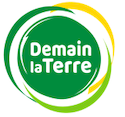In addition to maintaining the High Environmental Value certification for 8 farms, 32 new structures have obtained the highest environmental certification for agricultural farms managed in a collective framework by the Demain la Terre organization.
Implemented in 2012, the environmental certification for agricultural farms is an official tool of the Ministry of Agriculture based on three requirement levels and allowing producers to promote their commitment to the environment. Demain la Terre had obtained the level 2 of this certification on April 7th, 2015, by order of the Ministry of Agriculture.
The High Environmental Value or HEV corresponds to the third and last level of this certification and is based on performance obligations measured by indicators of environmental performance around four themes: protection of biodiversity, phytosanitary strategy, fertilization management and water resource management.
It is this performance obligation which structures the Demain la Terre® charter, thus helping member-producers of the organization to obtain the HEV certification. In 2018, obtaining the certification in a collective framework was a first in the fruit and vegetable sector (source: Ministry of Agriculture, May 3rd, 2018).
Going through Demain la Terre has several advantages. The first is practical because managing the certification in a collective framework simplifies things for our producers. The second is technical because the requirement level of the Demain la Terre® charter allows the producers to easily meet the necessary conditions to obtain the High Environmental Value.
Here is the list of the concerned structures:
• SAS Val de Sérigny, melons (2018)
• SCEA Pot-au-Pin, carrots and leeks (2018)
• SARL Le Jardin de Rabelais, tomatoes and cherry tomatoes (2018)
• SCEA Verger de la Blottière, apples and pears (2018)
• SARL Clos des Costières - Saveurs des Clos, stone fruits (2018)
• 1 member farm of Saveurs des Clos, stone fruits (2019)
• SARL Picvert, salads and young shoots (2019)
• 1 farm of Champs de Légumes, tasty carrots, celery, turnips, beets (2019)
• 1 group of farms of SARL Picvert, salads and young shoots (2020)
• 3 more farms of Saveurs des Clos, stone fruits (2020)
• 1 farm of Fruits Rouges & Co., red fruits (2020)
• 26 farms of Kultive, cucumbers, eggplants, cherry tomatoes, red beets (2020)
• 1 farm of Ferme de la Motte, potatoes, onions, shallots, échalions (2020)
Demain la Terre was created in 2004. Today, the cooperative brings together 18 companies which produce and process fruit and vegetables, all with the same vision of agriculture and sustainable development, combining environment/biodiversity, economy and society. Demain la Terre developed its own specifications, the Demain la Terre® charter, which aims to provide consumers with credible evidence of the producers’ commitment, based on three priorities: health, quality and the respect of people and the environment. Its application is checked annually by an independent body. More than 180,000 tons of fruit and vegetables are “certified” Demain la Terre. It is the CSR reference for fruit and vegetable farming, a third way with conventional and organic agriculture. Demain la Terre is one of the founding members of the Third Way Collective of the Responsible Agricultural Sectors.
For more information:
Damien Sanchez
Demain la Terre
Phone: 05 62 60 19 03
Mobile: 06 47 00 29 94
damien.sanchez@demainlaterre.org
www.demainlaterre.org
